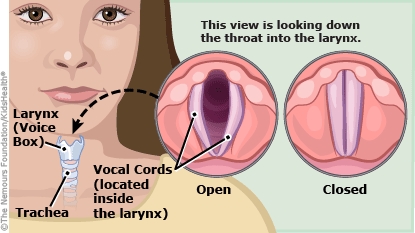Vocal Cord Dysfunction: How to Care for Your Child
The vocal cords are two pieces of tissue that stretch across the voice box. They vibrate to make sound when a person speaks. During vocal cord dysfunction, a "trigger" causes the vocal cords to partially close at the wrong time. When this happens, a person may have trouble breathing, wheeze or make raspy sounds, be hoarse or have other voice changes, cough or clear the throat, or have chest or throat tightness.
With treatment, your child can learn to relax their vocal cords while breathing and improve the vocal cord dysfunction.


To help prevent vocal cord dysfunction:
-
Work with your child and the health care provider to find what triggers your child's vocal cord dysfunction. Help your child avoid things that you know trigger it.
-
Follow your health care provider's instructions for treating any medical conditions that trigger it.
Follow your health care provider's recommendations about:
-
scheduling any testing or imaging studies
-
going to see specialists, such as a speech therapist
-
scheduling follow-up visits
If your child has vocal cord dysfunction again:
-
Stay calm and comfort your child.
-
Tell your child to take short, quick breaths (pant).
-
If your child also has asthma, treat the asthma as directed by your health care provider.
-
Help your child do any exercises that your health care provider or speech therapist recommended.

Your child still has episodes of vocal cord dysfunction after following the health care provider's and speech therapist's instructions.

Your child has trouble breathing after doing the breathing exercises they were taught.
If your child turns blue or struggles to breathe, call 911.

What causes vocal cord dysfunction? Certain "triggers" can cause episodes of vocal cord dysfunction, such as:
-
exercise
-
infections (like a cold or the flu)
-
asthma
-
anxiety or stress
-
inhaling smoke, dust, pollution, or perfumes
Sometimes it's not clear what triggers an episode. Allergies and acid reflux (chronic indigestion) can make vocal cord dysfunction worse.
How is vocal cord dysfunction diagnosed? A doctor diagnoses vocal cord dysfunction by asking questions, doing an exam, and looking inside the throat with a tiny camera. The doctor may also order tests, such as a breathing/lung test or an X-ray.
How is vocal cord dysfunction treated? Vocal cord dysfunction is treated by an ear, nose, and throat doctor (ENT, also called an otolaryngologist), a pulmonologist (lung/breathing doctor), and a speech therapist. They work together to help the child avoid triggers and learn to relax the vocal cords while breathing. They will also treat any medical problems that make the vocal cord dysfunction worse. If stress or anxiety are triggers, they may recommend that the child talk to a counselor for tips on managing these strong feelings.